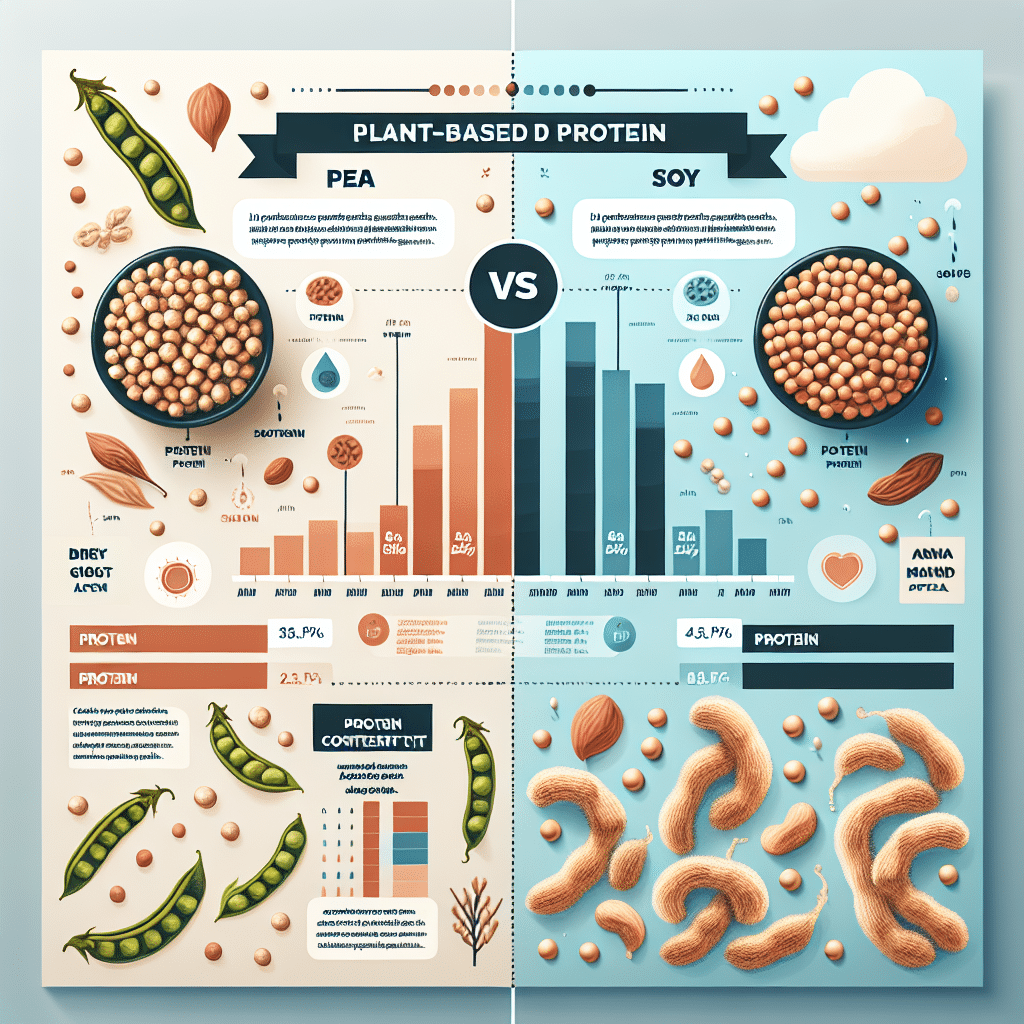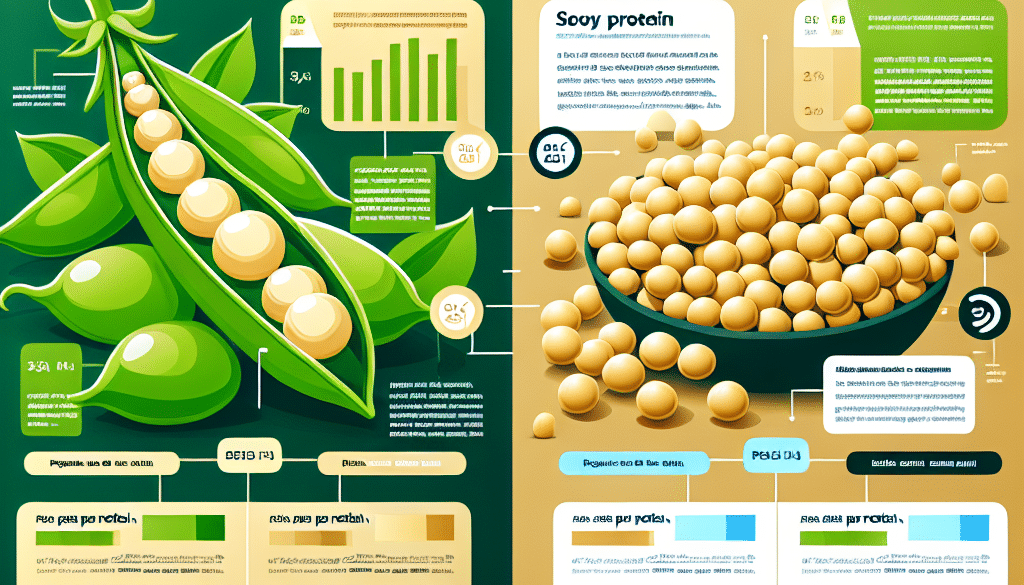Pea Protein vs Soy Protein: Comparing Plant-Based Proteins
-
Table of Contents
- Pea Protein vs Soy Protein: The Ultimate Plant-Based Protein Showdown
- Understanding Plant-Based Proteins
- Nutritional Profile: Pea Protein vs Soy Protein
- Health Benefits and Considerations
- Environmental Impact and Sustainability
- Applications and Versatility
- Conclusion: Making the Right Choice for Your Diet
- Discover ETprotein’s Premium Plant-Based Proteins
Pea Protein vs Soy Protein: The Ultimate Plant-Based Protein Showdown

As the popularity of plant-based diets continues to rise, the demand for high-quality vegan protein sources has never been greater. Among the plethora of options available, pea protein and soy protein stand out as two of the most popular and widely consumed plant-based proteins. In this article, we’ll delve into the nutritional profiles, health benefits, and potential drawbacks of both pea protein and soy protein, providing you with the information you need to make an informed choice about which protein is right for you.
Understanding Plant-Based Proteins
Before we compare pea and soy proteins, it’s important to understand what makes plant-based proteins different from their animal-based counterparts. Plant-based proteins are derived from various plant sources and are essential for those following vegetarian or vegan diets. They are also a sustainable alternative to animal proteins, with a lower environmental footprint.
Nutritional Profile: Pea Protein vs Soy Protein
When it comes to nutritional content, both pea and soy proteins offer a robust profile of amino acids, vitamins, and minerals. However, there are some key differences to consider:
- Pea Protein: Derived from yellow split peas, this protein is rich in iron and arginine, an amino acid that’s beneficial for heart and muscle health. Pea protein is typically low in methionine but is free from common allergens found in other proteins.
- Soy Protein: Extracted from soybeans, soy protein is a complete protein, containing all nine essential amino acids. It’s also a good source of B vitamins, fiber, potassium, and magnesium. However, soy is a common allergen and can be problematic for some individuals.
Health Benefits and Considerations
Both pea and soy proteins have unique health benefits that make them attractive options for different dietary needs:
- Pea Protein: Its hypoallergenic nature makes it suitable for those with food sensitivities. The high iron content is particularly beneficial for vegetarians and vegans who may struggle to meet their iron requirements.
- Soy Protein: Studies have shown that soy protein can help lower cholesterol levels and may reduce the risk of heart disease. It also contains isoflavones, compounds that have been linked to a reduced risk of certain cancers.
However, there are considerations to keep in mind:
- Pea Protein: Some people may find the taste and texture less appealing than other protein powders. Additionally, since it’s not a complete protein, it should be paired with other protein sources to ensure a balanced amino acid intake.
- Soy Protein: Concerns have been raised about the phytoestrogens in soy and their potential impact on hormone levels, although research is inconclusive. Additionally, much of the soy produced globally is genetically modified, which may be a concern for some consumers.
Environmental Impact and Sustainability
The environmental impact of our food choices is an increasingly important consideration. Here’s how pea and soy proteins stack up:
- Pea Protein: Pea cultivation requires less water and fertilizer than many other crops, making it a more sustainable choice. Peas also fix nitrogen in the soil, reducing the need for chemical fertilizers.
- Soy Protein: While soybeans are also nitrogen-fixing plants, the widespread cultivation of soy has been associated with deforestation and habitat destruction, particularly in South America. Choosing organic and non-GMO soy can help mitigate these environmental concerns.
Applications and Versatility
Both pea and soy proteins are versatile and can be used in a variety of applications:
- Pea Protein: It’s often found in protein shakes, bars, and meat substitutes. Its ability to emulsify and gel makes it useful in vegan cooking and baking.
- Soy Protein: Soy protein is used in a wide range of products, from tofu and tempeh to protein powders and meat alternatives. Its texture and flavor make it a popular choice for those transitioning to a plant-based diet.
Conclusion: Making the Right Choice for Your Diet
In conclusion, both pea protein and soy protein offer unique benefits and can be excellent additions to a plant-based diet. The choice between the two ultimately depends on individual dietary needs, taste preferences, and environmental considerations. By understanding the differences between these proteins, you can make an informed decision that aligns with your health goals and values.
Discover ETprotein’s Premium Plant-Based Proteins
If you’re looking for high-quality plant-based protein options, ETprotein offers a range of products that cater to various dietary requirements and preferences. Their selection includes organic pea protein and soy protein, ensuring that you have access to the best vegan protein sources on the market. With ETprotein’s commitment to non-GMO, allergen-free products, you can trust that you’re getting the purest form of plant-based nutrition.
About ETprotein:
ETprotein, a reputable plant protein vegan protein Chinese factory manufacturer and supplier, is renowned for producing, stocking, exporting, and delivering the highest quality organic bulk vegan protein and plant proteins. They include Organic rice protein, clear rice protein, pea protein, clear pea protein, watermelon seed protein, pumpkin seed protein, sunflower seed protein, mung bean protein, peanut protein etc. Their offerings, characterized by a neutral taste, non-GMO, allergen-free attributes, cater to a diverse range of industries. They serve nutraceutical, pharmaceutical, cosmeceutical, veterinary, as well as food and beverage finished product distributors, traders, and manufacturers across Europe, USA, Canada, Australia, Thailand, Japan, Korea, Brazil, and Chile, among others.
ETprotein specialization includes exporting and delivering tailor-made protein powder and finished nutritional supplements. Their extensive product range covers sectors like Food and Beverage, Sports Nutrition, Weight Management, Dietary Supplements, Health and Wellness Products, and Infant Formula, ensuring comprehensive solutions to meet all your protein needs.
As a trusted company by leading global food and beverage brands and Fortune 500 companies, ETprotein reinforces China’s reputation in the global arena. For more information or to sample their products, please contact them and email sales(at)ETprotein.com today.












